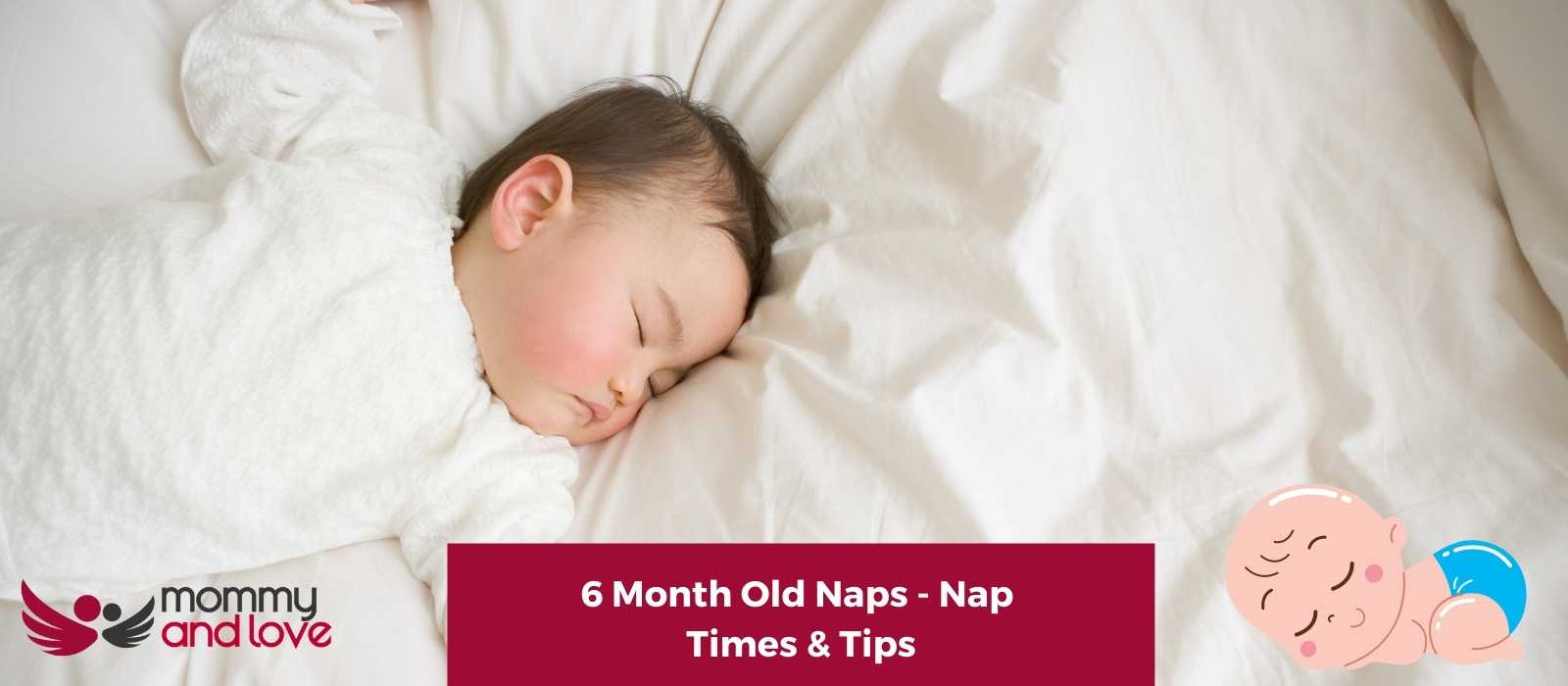If you’re the parent of a six-month-old, then you know that nap time is a crucial part of the day. Naps provide your little one with much-needed rest and help them stay alert during the day.
The average 6-month-old baby needs at least three naps a day, with 1 to 2 hours of being awake in between. The time between waking up and the first nap is usually the shortest of the day. Many babies are ready for that first nap after being awake for 2 hours.
How Long Should a 6-Month-Old Nap?
Most babies this age sleep about 15 to 18 hours a day, including naps. But they may have only one or two naps during the day. The length and timing of your baby’s naps will change as he gets older.
At this age, most babies need:
- About 11 to 12 hours at night
- At least two naps (might take between 20 minutes to 2 hours) during the day
You may notice that your baby’s naps get shorter and more irregular as he gets older. This is normal. By the time he’s about a year old, he’ll probably be down to one nap a day. Some babies start sleeping through the night without waking up for feeding by this age, too.
How Many Naps Does Your 6-Month-Old Need?

At six months old, your baby might be taking two to three naps a day. But how many naps they need each day can vary. Some babies may only need two naps, while others may still need three.
The number of naps your baby takes can also change from day to day. For example, your baby might take three naps on Monday, but only two on Tuesday.
You’ll know your baby is getting the right amount of sleep if they’re happy and content during the day. If you’re ever unsure about how many naps your baby needs, talk to their pediatrician. They can help you figure out a sleep schedule that’s right for your little one.
What Do Short Naps Tell About Baby’s Sleep Cycles?
There are four main sleep cycles in a baby’s day. The first two happen before naptime, and the last two occur after. So, if your baby takes a short nap, it could mean that they’re not getting enough deep sleep during the first half of the day. This can be indicative of an underlying sleep issue, like a sleep disorder.
Short naps can also be caused by an early bedtime. If your baby goes down for the night too early, they may wake up feeling rested but not sleepy and unable to get back to sleep. This can lead to shorter naps during the day.
After 6 months, most babies will outgrow their usual nap and wake time and most of them take a long nap in the morning.
What Is a Good Naptime Schedule for a 6-Month-Old?

If you have a six-month-old, you may be wondering what the best naptime schedule is for your little one.
The good news is that there are no hard and fast rules when it comes to naps. However, most experts recommend that six-month-olds take three naps per day.
The first nap of the day should ideally be taken a few hours after your baby wakes up in the morning until she’s ready to get back to sleep at a later time. The second nap should be taken mid-day, and the third nap should be taken in the early afternoon.
Of course, every baby is different, so you may need to experiment a bit to find what works best for your baby’s night sleep and nap time.
What Are Normal 6-Month-Old Sleep Cycles?
Most babies that are out of the newborn stage sleep for about 16 hours a day, broken up into two or three naps and one long stretch at night. But their sleep patterns can vary a lot from one day to the next. They no longer take longer naps and short wake window into the next sleep cycle like they used to.
Some days your baby may seem like she’s on an unpredictable schedule, sleeping more during the day and less at night, or vice versa. For instance, they might spend less time in lighter sleep before they go into a deeper sleep.
Growth-link sleep cycles are normal. Your baby’s sleep patterns will become more regular as she gets older.
Why Your Baby Only Naps 30 Minutes

The answer, according to baby sleep experts, is that it’s developmentally appropriate.
Most older babies this age are in the midst of what’s known as the transition to solid foods. This process can take a few months, and during this time, babies’ sleep patterns often change. They may start to wake up more frequently at night, and take short baby naps during the day.
Additionally, if you’ve ever had a baby, you know that they sleep in cycles. These sleep cycles are usually around 30 minutes long. So when your baby takes a nap, they’re only going to sleep for about 30 minutes before they wake up again.
How Do I Get My 6-Month-Old to Sleep Longer Than 30 Minutes?
If your baby naps and sleeps for 30 minutes in one sleep cycle, it can be frustrating. Here are some tips to help you get your baby to have longer sleep stretches during his day sleep or nap:
- Develop a bedtime routine and stick to it. A bedtime routine can help signal to your baby that it is time to sleep.
- Make a predictable nap schedule and adjust his napping patterns to help your baby nap longer. You can also encourage your young babies to take restorative sleep (at least two hours) as much as possible.
- Make sure the environment in your baby’s bedroom is conducive to sleep. This means getting younger babies to sleep in a quiet, dark room. If you make your baby’s room dark, it also helps shorter your baby’s awake time and will help him go back to sleep.
- Try not to let your baby become overtired. It can be difficult for an overtired baby to fall asleep and stay asleep.
- Get your baby to fall asleep independently. Independent sleep means not rocking or nursing your baby to sleep. Once your baby learns how to sleep independently you can expect longer naps and a shorter wake window.
- Keep an eye on the baby awake times and sleep cycle. If your baby is awake for too long, he or she will become overtired and have a harder time sleeping.
- Try not to go into the baby’s room every time he or she makes a noise to encourage a longer nap. This can disrupt sleep and make it harder for your baby to fall back asleep.
- Fill your baby’s belly. A full stomach can help your baby sleep longer and only wake up during age-appropriate awake times.
- Try white noise. White noise can help soothe your baby and make it easier for him or her to sleep. And this also helps him go back to sleep if he ever wakes up in the middle of the night.
- Don’t worry if your baby falls asleep but wakes up after 30 minutes or one hour through the night. Most newborn babies don’t start sleeping through the night until they are around six months old.
These are just a few sleep tips to help you get your baby to sleep longer. With a little bit of trial and error, you can find what works for your baby. But keep in mind that the length of your baby’s nap time depends entirely on the baby’s age.
When Should the Last Nap Be for a 6-Month-Old?

As your baby grows, their sleep needs will change. By six months old, most babies no longer need a day sleep or nap. However, some may still need one or two short naps during the day.
The last afternoon nap of the day should be no later than five o’clock in order to avoid interfering with nighttime sleep. If your baby is still taking naps, make sure to keep them short and sweet so they’re well-rested for bedtime.
How to Make a 6-Month-Old Baby Fall Asleep Independently
It’s no secret that getting a baby to sleep through the night is every parent’s dream. But what about when your baby is just six months old? Is it possible to get babies to learn the skill of falling asleep independently?
The answer is yes! With a few simple tweaks to their sleep environment, you can help your six-month-old baby fall asleep on his own.
Here are a few tips:
- Make sure their bedroom is dark and quiet. Babies sleep best in an environment that is free from distractions and noise. By creating a space that is conducive to sleep, you’ll help your baby wind down and prepare for bedtime.
- Invest in a white noise machine. This is a great way to block out any outside noise that might disrupt your baby’s sleep. Plus, the calming sound of white noise can help soothe your baby and lull them to sleep.
- Create a bedtime routine. A consistent bedtime routine will signal to your baby that it’s time to wind down and go to sleep. Try incorporating a few calming activities, such as reading or singing a lullaby.
- Sleep training can be a great way to help your baby learn how to fall asleep on their own. There are a variety of sleep training methods, so be sure to do your research and find the one that is right for you and your baby’s temperament.
- Find ways to reduce night wakings. Babies having wake time at night is pretty common for six-month-olds, but there are a few things you can do to help reduce them. Adjust your baby’s nap schedule by cutting out naps during the day or moving bedtime earlier. You can also try dream feeding, which is when you feed your baby right before they go to sleep.
- Work on your baby’s restorative naps. Naps are crucial for six-month-olds, so make sure your baby is getting enough daytime sleep. If your baby is having trouble napping, try adjusting their sleep environment or implementing a short nap schedule.
It can be a daunting task to make a baby sleep on his own but it’s entirely possible.
Why Is My 6-Month-Old Waking Up So Often at Night?
There are a few reasons your baby might be waking up more often at night. One reason is called sleep pressure. Sleep pressure is the build-up of fatigue that happens throughout the day. This is why it’s important to have regular naps during the day.
Another reason could be negative sleep associations. This means that your baby has learned to associate certain things with falling asleep. For example, if you always rock your baby to sleep, they may start to wake up at night expecting to be rocked.
There is also something called a sleep regression. This is when your baby’s sleep patterns change and they start waking up more often. This usually happens around the same time as developmental milestones like learning to roll over or sit up.
Finally, your baby may be waking up more often because they have shorter wake windows. This means that they need to sleep more often because their periods of wakefulness are shorter. This is especially true about your baby’s short naps during the day.
If you’re wondering why your baby is waking up more at night, it could be one of these reasons. If you’re concerned, talk to your doctor or a sleep specialist. They can help you figure out what’s going on and how to get your baby back to sleeping through the night.
Are Short Naps Good for Babies?
It depends on the age of the baby. For newborns, short naps are fine because they need to eat often. But as babies get older, they need longer periods of sleep to consolidate their nighttime sleep.
So if your baby is taking three short naps per day, you might want to consider consolidating them into two long naps. However, every baby is different, so be sure to do a bit of trial and error to find out what works for your baby and what doesn’t.
Conclusion
Although your baby’s sleep habits may change often, one thing that will remain constant is their need for night sleep. As your little one grows and changes, so will their sleep needs. Be sure to adjust nap times and bedtimes accordingly to ensure they’re getting the best quality rest possible.
If you have any questions or concerns about your baby’s sleep, be sure to speak with your pediatrician.

This article was written by: Gian MIller – Full-Time Writer, Baby Whisperer & Dad of 3.
Gian spends a lot of his time writing. A self-proclaimed baby whisperer, Gian has been through it all with his own children and is passionate about sharing his hard-won wisdom with other parents. When he’s not writing or changing diapers, you can find him playing the guitar or watching baseball (or preferably both at the same time).




